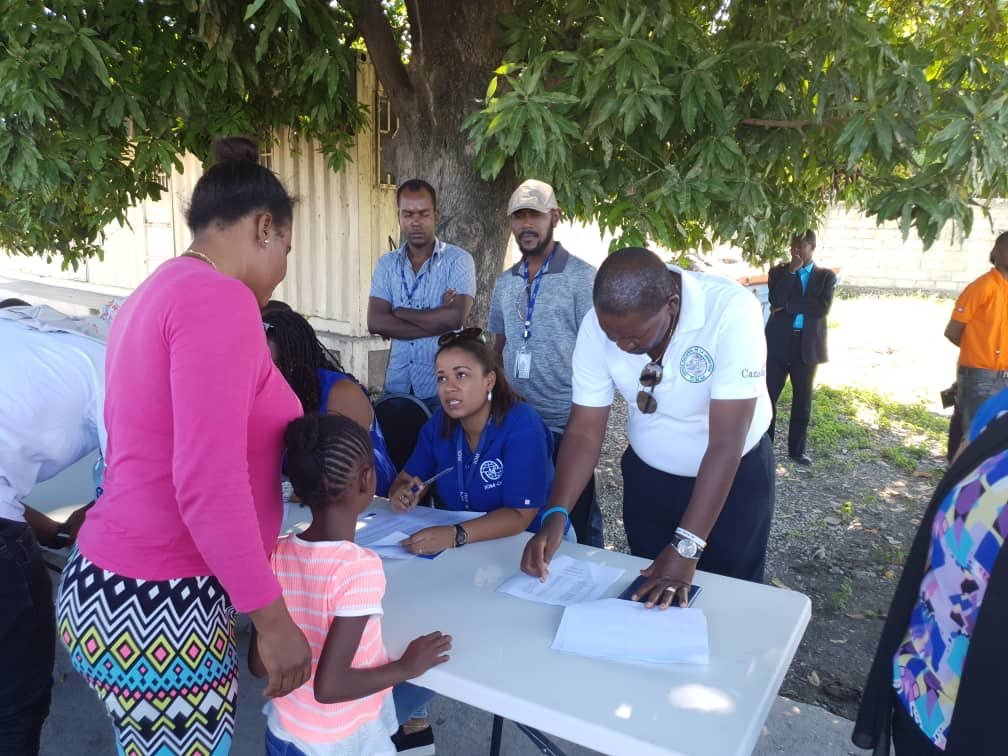NASSAU, BAHAMAS – The Bahamas government has deported more than 200 people to Haiti in the aftermath of Hurricane Dorian as ongoing political and humanitarian crisis in that country deepens.
A charter of 105 migrants was sent to Haiti yesterday morning, according to Giuseppe Loprete, the International Organization for Migration’s (IOM) Chief of Mission in Haiti.
Those migrants are reportedly headed for slums in North Haiti, where food insecurity has skyrocketed and economic activity is at a near standstill following months of political and civil unrest.
“Realistically no,” said Giuseppe Loprete, IOM’s Chief of Mission in Haiti, who was asked if deported migrants will be able to make a living.
“It is very difficult to say, these men were working in The Bahamas so they have some skills. They were working construction but unfortunately the economic situation is not conducive. It is unlikely they can make their own livelihood.
“We hope we can monitor the situation in some months and see what will happen now that they become part of the population here. They are going to areas where food insecurity is very high and economic activity is very minimal.
“They will join these communities, and it is not possible to be positive in this sense right now.”

Dorian displaced thousands as it ripped through parts of Grand Bahama and Abaco on September 1-3.
The latest Central Bank projections indicate asset losses due to Hurricane Dorian could surpass 20 per cent of GDP— or more than $2.5 billion; with 67 confirmed dead and more than 300 missing.
The Category 5 storm decimated two of the largest shantytowns on Abaco, The Mudd and Peas, where the majority of the respondents to the government’s 2018 survey were self-reportedly undocumented Haitian migrants.
As of Friday, there were 761 Dorian evacuees living in the Kendal G.L. Issacs Gymnasium, three surrounding tents, and the Bahamas Academy Gymnasium.
Construction is underway on a $6.4 million family relief city to house displaced storm victims; however, officials have made clear undocumented migrants will not be accommodated.
Yesterday, Loprete said the group of 73 men and 32 women did not have any Haitian documents, while some indicated they had Bahamian documents but could not be verified.
Among those deported were a pregnant woman, and two children: a boy and girl.

“Some of them spent one month in detention , others 20 days or few days only,” Loprete said.
“Many traumatized by the situation.”
Haiti’s Minister of Foreign Affairs Bocchit Edmond has appealed for a moratorium on repatriations to allow migrants to settle themselves in the aftermath of the monster storm, and to replace documents.
The United Nations High Commissioner for Human Rights has also expressed concerns over the deportation of storm victims, and called on the government to suspend mass immigration enforcement policies to allow for due process entitled under international law.
However, the government has maintained it will continue to enforce immigration laws in compliance with international treaties, and in a humane manner.
“None of them had Haitian documents,” Loprete continued.
“Some of them said they have documents from The Bahamas but they couldn’t verify, but nobody with documents from Haiti.
“On arrival they were very upset but then the situation calmed down, they understood that now they are in Haiti and authorities were there.
He added: “Some of them said they don’t want to go back to The Bahamas, it’s not what they want to do because it was difficult. But others still have in mind if they get the chance, they will go back.”
Loprete confirmed the first charter sent by the Bahamas government had 112 migrants, but noted some have been sent back in small groups on commercial flights.
Yesterday, deportees were registered by IOM and officials from the National Office for Migration, and the Ministry of Foreign Affairs.

Loprete said the group was given cash to pay for their transportation to areas in North Haiti; however, migrants were stalled for hours at the airport as buses could not get through barricades erected in the street due to ongoing protests.
The roads were still blocked when he spoke to Eyewitness News Online around 1pm.
“It’s been already almost two months, there is a political lockdown of the country,” Loprete said.
“Two million children are not going to school. Earlier this week there was a report of high level, 40 percent, food insecurity. There are humanitarian concerns at the hospitals, a lot of issues getting supplies and medicines to continue functioning.
“Civil unrest, the country is under – every day there is still barricades in the streets a lot of roads are inaccessible, gang violence. Two main access roads of country to go north and south are blocked, and that is another concern because all these migrants will have to travel by road to go to the north.”
Haitians have repeatedly protested corruption, inequality and economic hardship this past year; the latest round of demonstrations began in the streets of the capital, Port-au-prince, on 15 September.
Since then, the United Nations reported 42 people have died, and 86 have been injured in escalated tensions.
Loprete continued: “We don’t know how the situation will unfold but it’s been two months without public services. Since march there is no government, government is functioning only for current affairs, we don’t know what will happen later.
“This is the context, in this situation migrants are going back to areas where, with local currency, it is difficult to buy food or anything. Economic activity is at a minimum, it is already difficult for families around here.
“For migrants coming back from The Bahamas it will be even more difficult,” he said.
Loprete noted another area of concern that may emerge will be the impact on remittances.
“Haitian migrants abroad contribute 30 percent to the GDP of the country, highest in the diaspora,” he said.
“In The Bahamas it was a big diaspora, doesn’t matter if it was undocumented or not, they were sending cash to families. So now not only are families not receiving cash from migrants, now they are here also.
“This will have an impact,” Loprete added.
“Unfortunately to measure this we will have to wait, but based on what we know already it will be an even more problematic situation.”






